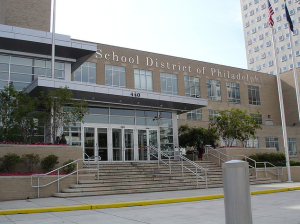News & Announcements
- Details
- Written by Joshua Wachtel
An August 7, 2012 piece, "Researchers Sound Alarm Over Black Student Suspensions," at EdWeek by Nirvi Shah and Lesli A. Maxwell begins:
Nearly one in six African-American students was suspended from school during the 2009-10 academic year, more than three times the rate of their white peers, a new analysis of federal education data has found.
- Details
- Written by Joshua Wachtel
 via Flickr Creative Commons User: It's Our City[Today Kristen Graham in the Philadelphia Inquirer writes that the Student Reform Commission approved major revisions to the student conduct code: "The new policy is the most extensive set of revisions to the student rules in years." The policy "gives principals more latitude in meting out discipline and means that students cannot be suspended for infractions such as using profane language or failing to follow a dress code."
via Flickr Creative Commons User: It's Our City[Today Kristen Graham in the Philadelphia Inquirer writes that the Student Reform Commission approved major revisions to the student conduct code: "The new policy is the most extensive set of revisions to the student rules in years." The policy "gives principals more latitude in meting out discipline and means that students cannot be suspended for infractions such as using profane language or failing to follow a dress code."
Incoming Superintendent William J. Hite, Jr. is quoted in the article as saying, "We can't suspend our way to higher student achievement. We can't arrest or suspend our way to safer schools."
- Details
- Written by IIRP
View the conference schedule and presentation materials (where provided).
- Details
- Written by Joshua Wachtel
Putting Theory into Practice: The Restorative Way
This conference will spotlight the City and County of Swansea, which is bringing restorative practices training and services to those who work with children and young people in the area. Teachers, police, social workers and a variety of agencies throughout the city have recieved training programs developed by the International Institute for Restorative Practices.
Plenary speakers include Jack Straw, Chief Executive of the Swansea Council; Lizzie Nelson, Director of the Restorative Justice Council; Marian Quinne, CEO, CDI West Tallaght, Dublin, Ireland; and Val Keitch, Manager, South Somerset Community Justice Panel.
- Details
- Written by Joshua Wachtel
Last week Lehigh Valley News reported on the IIRP's 15th World Conference. They focused on Steve Korr's plenary and related his talk to implementation of restorative practices in two Lehigh Valley School Districts, Allentown and Bethlehem. They quoted Korr below:
- Details
- Written by Joshua Wachtel
The Truth and Reconciliation Commission of Canada invites the public – in person or via webcast – for an event on August 14, 2012, 7:30 to 9:30pm (ET), Harbourfront Centre’s WesJet Stage, 235 Queens Quay West, Toronto, Ontario, CANADA.
The evening will feature a keynote address by TRC Chair Justice Murray Sinclair, drummers and dancers from the Aboriginal and Black communities and an Authors’ Dialogue moderated by veteran broadcast journalist, Shelagh Rogers.
- Details
- Written by Laura Mirsky
Greetings from Day Three of the IIRP's 15th World Conference, "Building a Worldwide Restorative Practices Learning Network."
Jean Schmitz, Founder and Director of the Latin American Institute of Restorative Practices presented the day's only plenary session, Restorative Practices in Neighborhoods in Lima, Peru.
He began by asking: Why are victims poorly served and re-victimized by the justice system? He then talked about how he and his colleagues are working to change this condition by establishing a "restorative zone" in Lima, Peru, with support from the city's mayor, Susana Villarán.
- Details
- Written by Laura Mirsky
Greetings from Day Two of the IIRP's 15th World Conference, "Building a Worldwide Restorative Practices Learning Network."
Vidia Negrea, director of CSF Hungary and Victim Support Psychologist, Hungarian Ministry of Justice, presented the day's first plenary session, Family Group Conferencing/Family Group Decision Making as a Transition from Prison in Hungary Negrea discussed how she has been using FGC/FGDM with prisoners and their families throughout Hungary. She described how and why it works, defining it as a collaborative process between professionals and families that balances the need for security with the need for maintaining family ties. FGC/FGDM, she said, empowers families to make decisions based on their own strengths and resources; creates a safe place to deal with needs and feelings (past and present) and develops collaboration between the family network and the community.
- Details
- Written by Jean Schmitz
Presented by Jean Schmitz in a plenary session on August 3, 2012, at the 15th IIRP World Conference, Building a Restorative Practices Learning Network, Bethlehem, Pennsylvania, USA, August 1-3, 2012
- Details
- Written by Steve Korr, Laura Mirsky
Presented by Steve Korr in a plenary session on August 2, 2012, at the 15th IIRP World Conference, Building a Restorative Practices Learning Network, Bethlehem, Pennsylvania, USA, August 1-3, 2012

Restorative Works Year in Review 2024 (PDF)
All our donors are acknowledged annually in Restorative Works.
